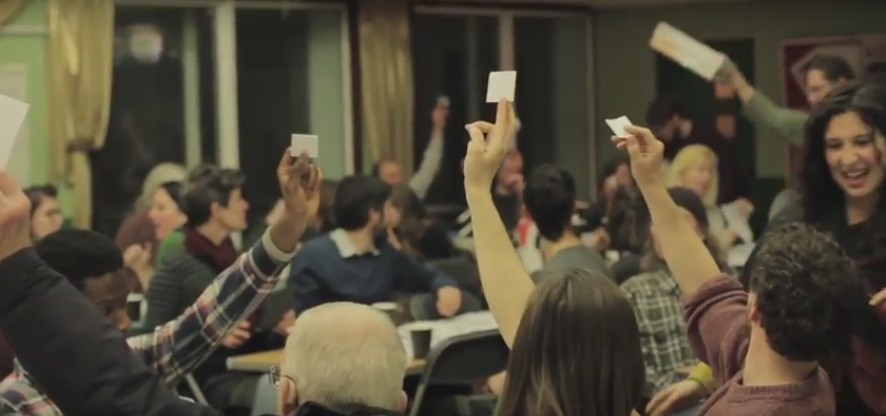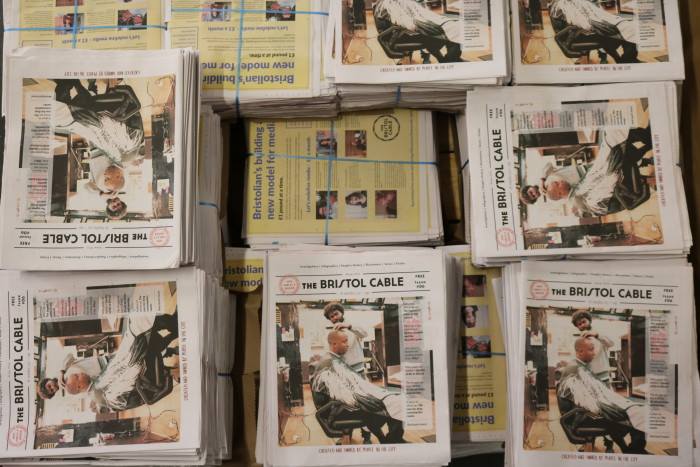The Bristol Cable, a media co-op created and owned by members living in the city, is celebrating two years of redefining local media.
Launched in November 2014 by a core collective of 10 people, the co-op wanted to set a news agenda that gave local people a real voice. Initial funding came from £3,300 of crowd funding and £1,500 apiece from Co-operatives UK and Lush Cosmetics; it is now a co-operative of 1,400 members with an office in the city centre.
“The Cable is proving that local media can be redefined both in terms of content and ownership,” says co-founder Alon Aviram.
“We started off without a blueprint – we didn’t really know how the Cable would be received by people in the city. But the co-op is increasingly being recognised as not a flash in the pan. We’re here to stay.”
Related … Good news for media co-ops
The Cable recently upped its circulation from 10,000 to 30,000 copies, distributed to 600 venues and thousands of households throughout Bristol. There has also been a focus on multimedia content – all of which has been a steep learning curve.
“We weren’t initially expecting to grow so quickly in terms of membership. We’re constantly working to ensure that we maintain our democratic character, innovating our systems to find ways to engage members meaningfully,” says Mr Aviram.
“Being a co-op shouldn’t be a marketing exercise – we are committed to being democratic in all areas of the organisation. As we grow and the public perceive the co-op to be in a position of strength, we need to increasingly make the case to the public that more members need to join.”
The main forum for members in The Bristol Cable is a monthly meeting, and key decisions can also be made via online discussion forum Loomio.

Media organisations can be expensive to run, making the Cable’s shoestring budget a challenge.
“We started on a zero budget,” says Mr Aviram. “Working part-time jobs to pay the rent on the side has also been stressful.”
As the co-op developed revenue streams, it had to decide whether to pay a small team of people to co-ordinate volunteers, or to spread the small pot of money among a wider team of coordinators so that everyone earned something for their labour at an equal rate.
Co-ordinators are currently being paid at an equal rate for their work, and this rate will increase collectively for everyone as the co-op grows stronger.
Over the past year the Cable has published a range of powerful content.
“Our investigation into emergency accommodation prompted a city council inquiry and national media coverage,” says Mr Aviram, “and original findings on police mobile phone spying generated national media coverage. Our long-term investigation on the sale of Bristol Port uncovered a controversial sale of public land with the limited safeguards to prevent fracking.”

Two years in, the co-operative has a strong focus on education and training, and so far over 1,400 people have benefited from free media training and events, from asylum seekers to pensioners and young people.
“We recently established the Bristol Cable Media Lab, an educational arm of the organisation dedicated to training people in media,” adds Mr Aviram.
“Over the coming six months we are training 15 participants for free in a range of journalistic areas, from data analysis and feature writing to Freedom of Information Requests and investigating Companies House.”
As the only citywide media co-operative in the UK, the Cable hopes to inspire others to follow suit. “We are turning people into both consumers and producers of their media,” says Mr Aviram.
“It has been inspirational to have so many people from all walks of life come and share skills and experience in developing the co-op.”

